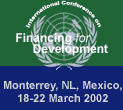
Live
Webcast |

Wednesday,
20 March 2002
PRESS
CONFERENCES
-
Secretary-General Kofi Annan was
due in Monterrey early this afternoon, when he would attend
a meeting at the Crowne Plaza Hotel, Susan Markham, Conference
Spokeswoman, said. He would attend the Summit tomorrow morning.
-
Jeffrey Sachs, Special Adviser
to the Secretary-General on the Millennium Goals, said consensus
had been reached on the need to spend vastly more money ($27
billion) on health.
-
Mark Malloch Brown, UNDP, said
that, while there would be a huge role in the Millennium campaign
for the United Nations, World Bank and other institutions, the
real energy would come from civil society.
-
Thoraya Ahmed Obaid, UNFPA, said
one sure way of dealing with illiteracy and health was investing
in women -- that was an investment with guaranteed high returns.
-
Gro Harlem Brundtland, WHO, said
that investing in people was crucial and would yield enormous
benefits, allowing millions of people to emerge from poverty.
-
United States Treasury Secretary
Paul O'Neill said Americans did not lack compassion or a charitable
spirit. Getting results was the issue - meaning, substantial
increases in the earned income level of the world's people.
-
Poul Nielson, European Commissioner
for Development and Humanitarian Aid, said only 3 per cent of
foreign direct investment (FDI) went to sub-Saharan Africa and
that was where official development assistance (ODA) became
important.
-
Members of the NGO Caucus of the
Least Developed Countries (LDCs) this afternoon described the
Monterrey consensus as a step backwards from all the commitments
made over the years to help alleviate poverty in LDCs. Monterrey
should be about immediate and concrete mobilization of resources,
because people were starving now.
-
NGO representatives from the United
States and the European Union said that, in the Monterrey consensus,
the absence of concrete commitments for achieving poverty eradication
had undermined the relevance of the whole consensus. Caroline
Wildeman, European NGO caucus, said that the ODA commitment
made by the Union was "face saving and inadequate".
The resources necessary to reach the Millennium Development
Goals went far beyond the extra money that would eventually
be available in 2006. Aldo Clieri, from the Center of Concern
in Washington, D.C., said the conditions attached to the money
provided by the United States were so subjective they could
be used for political purposes.
-
At a press conference entitled
"Business Investing in Africa", it was reported that
Africa presently received only about 1 per cent of total investment
flows. The private sector had a great deal to offer Africa,
but the potential had not yet been unlocked, said The Earl Cairns,
Chairman of the Commonwealth Development Corporation. Another
aspect of the discussion had been about how to offset the risk
of investments, such as through the banking centre and insurance
polices. Training and education had also been discussed. There
was a lot of "over-governance" in Africa -- government
had a lot of business, and private business could not compete
with it.
-
The Co-Chair of Ministerial Round
Table B2, Eveline Herfkens (Netherlands), said it was necessary
to ensure that, while a minister in charge of agriculture was
helping to boost production, his colleague was ensuring a proper
market for the increased production.
ROUND
TABLES
- The
need for coherence in development policies at all levels was stressed
by speakers in Ministerial Round Table B1. Speakers placed emphasis
on the need to reduce the number of conditionalities placed on
developing countries before aid delivery, while also emphasizing
the importance of promoting good governance.
- The need for coherence at the national level,
within international institutions and between international institutions
was emphasized during the discussion in Ministerial Round Table
B2. The lack of coherence in developing countries was often a
reflection of incoherence on behalf of donors and the international
community, stated one speaker.
- During Ministerial Round Table B3, speakers
stressed that conceptual and operational coherence was needed
at all levels, including between the major financial actors at
the international level, such as the World Bank, WTO and IMF.
It was also stressed that principles of coherence would help to
maximize the benefits and minimize the risks of globalization.
- At Ministerial Round Table B4 this afternoon,
Owen A. Arthur, Prime Minister of Barbados, said coherence between
trade and development policies was the most difficult to achieve.
Coherence, said one speaker, meant that markets must be seen as
a means and not as an end.
|
18
March 2002
19 March 2002
21 March 2002
22 March 2002 |


